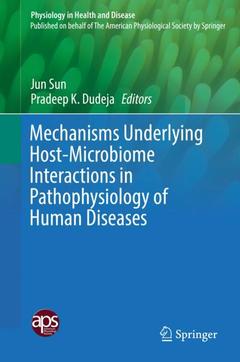Description
Mechanisms Underlying Host-Microbiome Interactions in Pathophysiology of Human Diseases, 1st ed. 2018
Physiology in Health and Disease Series
Coordinators: Sun Jun, Dudeja Pradeep K.
Language: English
Subjects for Mechanisms Underlying Host-Microbiome Interactions in...:
Keywords
Microbiome; Organoids; Obesity; Metabolism; Animal Models; Inflammation; Infection; Cancer
Publication date: 01-2018
Support: Print on demand
Publication date: 06-2019
381 p. · 15.5x23.5 cm · Paperback
Description
/li>Contents
/li>Biography
/li>Comment
/li>
Only recently have we begun to appreciate the role of microbiome in health and disease. Environmental factors and change of life style including diet significantly shape human microbiome that in turn appears to modify gut barrier function affecting nutrient & electrolyte absorption and inflammation. Approaches that can reverse the gut dysbiosis represent as reasonable and novel strategies for restoring the balance between host and microbes.
In the book, we offer summary and discussion on the advances in understanding of pathophysiological mechanisms of microbial host interactions in human diseases. We will not only discuss intestinal bacterial community, but also viruses, fungi and oral microbiome. Microbiome studies will facilitate diagnosis, functional studies, drug development and personalized medicine. Thus, this book will further highlight the microbiome in the context of health and disease, focusing on mechanistic concepts that underlie the complex relationships between host and microbes.
Dr. Pradeep K. Dudeja is a Professor of Physiology in Medicine at Univ. of Illinois at Chicago and a Senior Research Career Scientist at the Jesse Brown VA Medical Center, Chicago, IL, USA. His research primarily focuses on an understanding of the pathophysiology of diarrheal diseases and to develop better therapeutic int
Novel theme: no other book is combining host-bacterial interaction and organoid systems in studying human diseases
Multiple disciplinary: covers progress in host-microbiota interactions, using organoids, cell cultures, animal models, and human samples
Broad audience: physiologists and students working on the inflammatory diseases, metabolic diseases, infectious diseases, cancers, and other human diseases will be most interested in this book. Gastroenterologists, pathologists, microbiologists, and immunologists will also have interests in this book



